🍎 citymeetings.nyc #13
Organic Waste, B-HEARD, Workplace Fatalities, Water Safety, LGBTQ+ Youth in Foster Care, Civic Engagement, Language Access, DOC/CHS, the Stated Meeting
Welcome new subscribers! The format of this newsletter is:
- I give readers an update on citymeetings.nyc itself.
- I highlight curious/interesting moments and claims from a few recent meetings.
You can reply to this email directly with feedback, questions, and requests. I'll respond to it.
Howdy,
In mid-August I was a guest on a podcast where I talked about why I started citymeetings.nyc and how it works.
It's a data science podcast but don't let that fool you. It's a largely non-technical, easy listen.
I talk a lot about how citymeetings.nyc works. I also go into detail about the kinds of errors AI lobs at me + how I mitigate them.
The episode is also a bizarre time capsule!
August 15th was just 45 days ago, but several things are now true that were not true then:
- citymeetings.nyc has had its first month publishing meetings same-or-next day.
- Awareness and usage of citymeetings.nyc has grown significantly in government and public affairs.
- The newsletter is growing at steady clip.
- Folks use the site every day for work.
I mentioned last week that I'm assembling a small group of design partners in government, public affairs, and media to inform research tools I'm working on.
The idea is: you bring your previously-unanswerable or too-expensive-to-answer questions to me and I build tools to help you answer them.
These tools can help you:
- Understand public opinion at scale
- Analyze how various groups or legislators position issues.
- Assess a community board's needs in a nuanced way based on an entire years' worth of their meetings
- ... and more, based on questions you bring.
Thanks to those who reached out! If you are interested and you work in government, public affairs, or media, I recommend reading the update in last week's issue and replying to this email.
I intend to have an application process for this group soon. Unfortunately, last week was a doozy and I've been under the weather.
It's still coming, so stay tuned.
Thanks,
Vikram
For a complete listing of published meetings, visit https://citymeetings.nyc.
This week's highlights are from hearings on:
- DSNY's composting and recycling efforts
- The B-HEARD mental health crisis response program
- Establishing a database of workplace fatalities
- Water safety and drowning prevention
- The needs of LGBTQ+ youth in foster care
- How libraries help increase civic engagement
- Language access for services offered by NYC government
- Reforms in Department of Corrections (DOC) and Correctional Health Services (CHS)
... plus remarks from the Stated Meeting that took place the day after news of the mayor's indictment broke.
Hearing on waste diversion and recycling in NYC
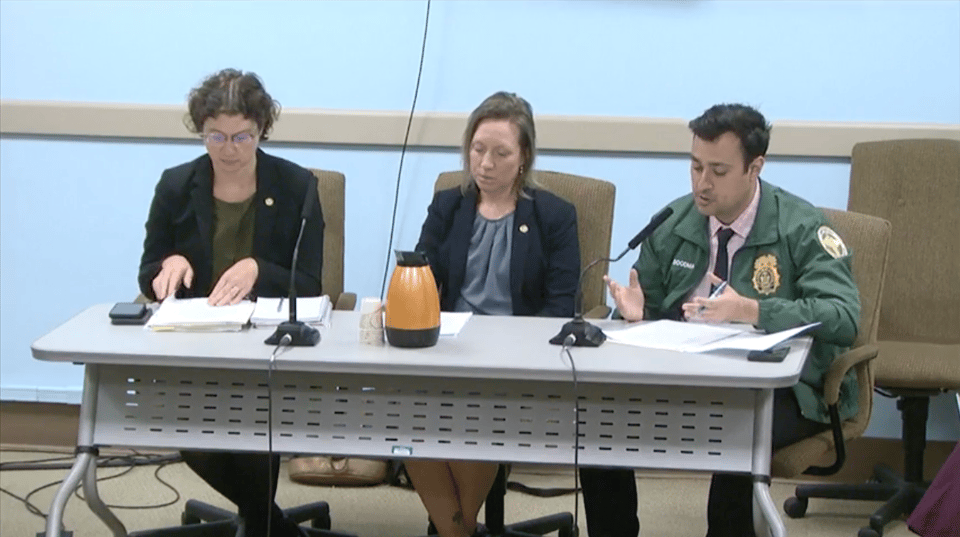 Joshua Goodman, Deputy Commissioner at DSNY, shares stats about organic waste diversion in NYC.
Joshua Goodman, Deputy Commissioner at DSNY, shares stats about organic waste diversion in NYC.
Note: Mandatory composting is coming to NYC. Here's a local news report about it.
This hearing has a bunch of interesting stats and answered practical questions around bins and enforcement.
- NYC produces almost 8MM tons of waste annually, split evenly between residential and commercial. Link
- The Zero Waste Act sets a city goal of diverting 100% of recyclable waste from landfills or incinerators. It requires DSNY to produce annual progress reports. Link
- 1.2B pounds of food were thrown away in 2022. 86MM pounds of discarded food were still in packaging. Organic waste makes up ~1/3rd of residential waste. Link
- NYC manages 24MM pounds of waste daily. Link
- DSNY is implementing financial incentives for businesses to divert recyclable and compostable waste. Link
- They urge the council to require commercial establishments to separate their waste by law.
- There's a steadily growing and successful school composting program. Link
- The residential composting program has seen a lot of success. Link
- The "diversion rate" of organic waste has increased every year.
- 65% more compostable materials have been saved from landfills in the last two years, reaching 260MM pounds.
- Expanding to two special waste sites per borough, open 7 days a week, would cost ~$7.7MM/year. Link
- NYC's per capita waste generation is relatively low compared to other areas in NY state. Link
- Brown compost bin deliveries are underway -- 1K being delivered each day. They'll even deliver bins if ordered by non-owner residents. Link
- DSNY encourages residents to report non-compliant landlords.
- Each address gets one free brown bin. Link
- Sanitation supervisors can use direction in enforcement if bins are missing. Summons for uncontainerized trash due to stolen bins can be contested with a police report. Link
- Bins also have RFID tags for identification!
- Smart bins were opened 1.2MM times in FY2024, 4x more than in FY2023. There is currently no funding for additional smart bins. Link
- How does DSNY observe compliance with mandatory composting when trash bags are opaque? There are telltale signs, like "the world famous garbage juice". Link
- Also -- the sanitation department has been known to open bags.
Hearing on the B-HEARD mental health crisis response program
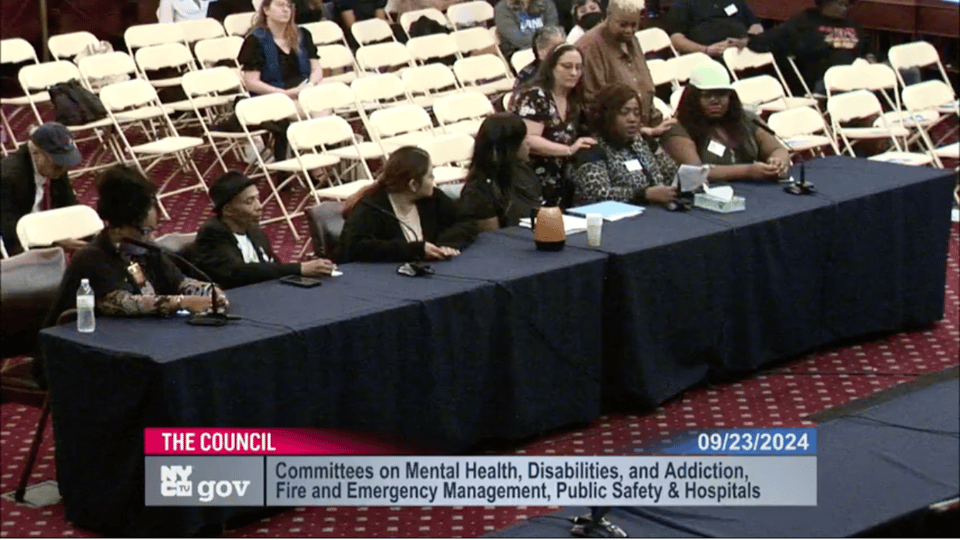 Sasha Myrie shares her story about calling 911 for a mental health crisis.
Sasha Myrie shares her story about calling 911 for a mental health crisis.
B-HEARD is a pilot program where EMTs/paramedics from FDNY and mental health professionals from NYC Health + Hospitals respond to 911 mental health calls.
Separately, a bill was introduced to increase school security funding as well.
- B-HEARD currently operates in 31 out of 77 precincts. Council member Narcisse calls for it to expand to all precincts. Link
- Public Advocate (and potential interim Mayor!) Jumaane Williams remarks on B-HEARD. Link
- Tiffany Caban shares response statistics from other cities and asks if people with mental health issues in NYC are fundamentally different or more dangerous than those in other cities. Link
- NYC 988 serves as "someone to call" in DOHMH's crisis services. They've provided counseling > 311K times in FY2024. Link
- Crisis Residences serve as "somewhere to go" in DOHMH's crisis services. They're an alternative to hospitalization. Link
- How does 911 evaluate if a call should be routed to B-HEARD? Link 1 Link 2
- Do yelling or property damage require a police response? Link
- There have been instances where the NYPD has been told they're not needed but they still responded, but this is largely due to the timing of when they receive the message. Link
- Lynn Schulman addresses Win Rozario's case. Link
- B-HEARD response times are 20 minutes on average. NYPD discusses how those responses are different. Link
- A number of individuals shared personal stories about mental health crisis and police response.
Hearing on establishing an online public database of workplace fatalities in NYC
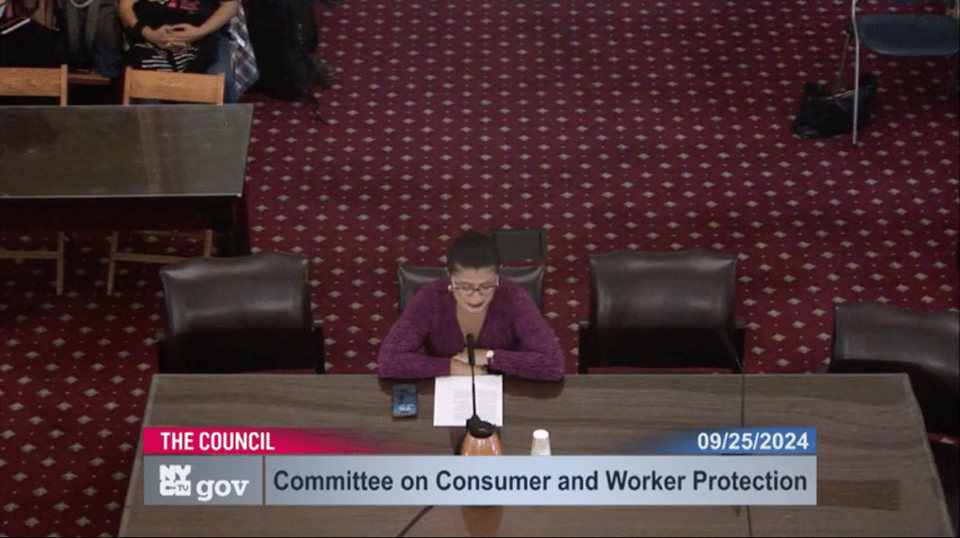 State senator and mayoral candidate Jessica Ramos testifies in support of establishing a public database of workplace fatalities.
State senator and mayoral candidate Jessica Ramos testifies in support of establishing a public database of workplace fatalities.
- Intro 865 requires the Department of Consumer and Worker Protection (DCWP) to create an online public database of workplace fatalities. Link
- NYC mayoral candidate and state senator Jessica Ramos testified in support. Link
- DCWP opposes the legislation. Link
- The commissioner asserts that federal, state, and local reporting systems already exist for this.
- The commissioner is also concerned about expanding beyond DCWP's core mission, stating that public health surveillance is not within their scope of work.
- The commissioner elaborates on his perspective regarding the scope of "worker protection" at DCWP. Link
- The NYC Central Labor Council testified in support. Link
- The Laborers' International Union of North America (LIUNA) testified in support. Link
- Julie Menin asked the above two why it's particularly important to have timely data on worker fatalities. Link
- The Uniformed Fire Officers Association testified in support. Link
- The Workers' Justice Project testified in support. Link
- The New York Committee for Occupational Safety and Health testified in support. Link
Hearing on water safety and drowning prevention
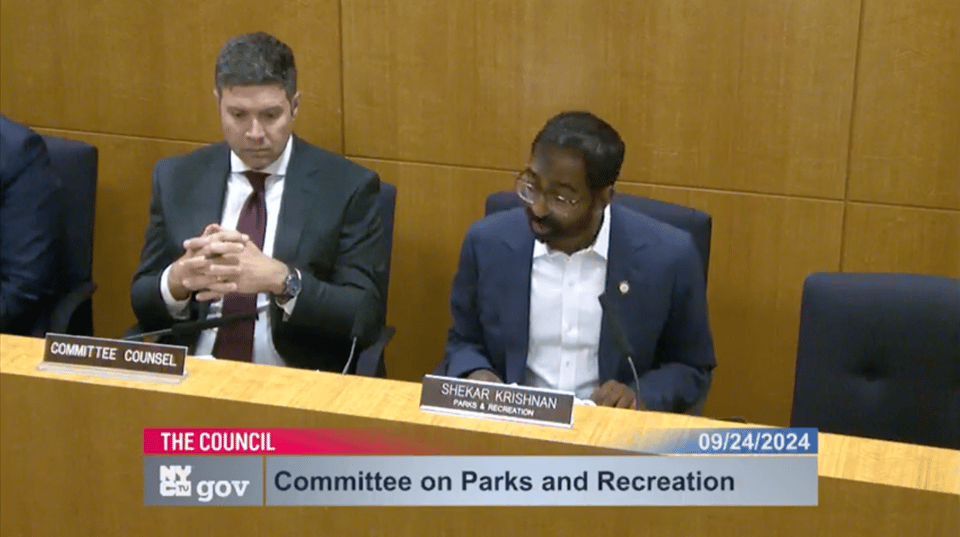 Shekar Krishnan opens the the hearing on water safety and drowning prevention.
Shekar Krishnan opens the the hearing on water safety and drowning prevention.
- The city's aquatic facilities include 53 outdoor pools, 17 mini pools, 12 indoor pools, and 9 beaches covering 14 miles of coastline. Link
- 7.4MM New Yorkers visited the beach this summer. Link
- 7 people drowned at city beaches in NYC this summer, the highest amount since 2019. Link
- 40MM US adults don't know how to swim. Link
- 25% of kids in NYC don't know how to swim. Link
- 65% of Manhattan residents can walk to a pool in 15 minutes. 12% can in Queens. Link
- The lifeguard shortage continues. We aim to assign 1400 by July 4th, we got to 900 this year. Link
- The Lifeguard Union renegotiated its contract with District 37 for the first time in 40 years. Link
- There's a baseline hourly wage of $22 and a $1K retention bonus.
- There is a free 6-month pool membership offered to those who pass the lifeguard qualifying test to train. Link
- There exists a law that requires universal swim lessons for second graders, but the parks department is not currently able to meet that goal. Link
- Julie Menin suggests using non-city pools to meet this goal -- they mapped out over 1,000 pools in the city that might be used. Link
- Amina Noah, whose son drowned this summer, testifies. Link
- Maryam Shuaib from Malikah shares an incident of Islamaphobia at Astoria pool and stresses that Muslim women often feel ostracized and unwelcome at pools. Link
- Kaitlin Krause, founder of Rising Tide Effect, testifies on the water safety crisis. Link
Hearing on the needs of LGBTQ+ youth in the city's child welfare system
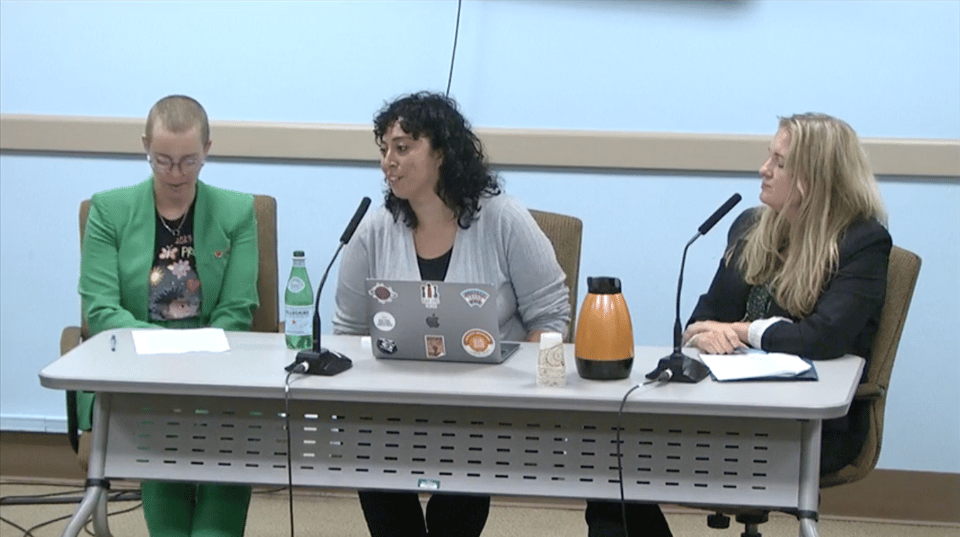 Panelists from the Ali Forney Center and Legal Aid Society give testimony.
Panelists from the Ali Forney Center and Legal Aid Society give testimony.
- Over 1/3 of youth in foster care aged 13-20 identify as LGBTQ+. Link
- During a "Shadow Day" with the city council, one of the youth came with a list of legislation addressing her treatment in foster care. Link
- ACS does not ask for LGTBQ+ information upon entry into placement in into the system. Link
- There exist various measures to address inappropriate behavior by foster care parents toward LGBTQ+ youth. Link
- In 2023, ACS reports there were 5 claims of bias/discrimination toward LGBTQ+ youth in the system. Link
- Legal Aid Society testifies with examples of how LGBTQ+ youth do not feel safe in foster care. Link
- A 36-year old mother shares her challenging experiences with ACS. Link
Hearing on how libraries help New Yorkers become informed voters & engaged citizens
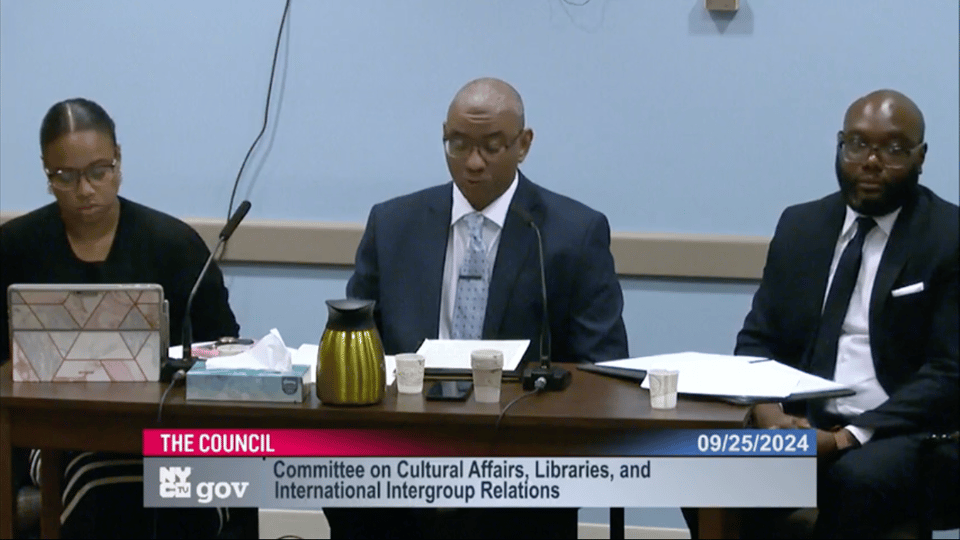 Representatives from Brooklyn/Queens/New York Public Library give testimony.
Representatives from Brooklyn/Queens/New York Public Library give testimony.
- The Queens Public Library hosted voting for participatory budgeting in 23 locations. Link
- NYPL has an "Innovation Lab" initiative, which resulted in free citizenship classes in Spanish and a civic festival where folks learn about civics and how local government shapes public policy. Link
- 16 Brooklyn Public Library locations serve as polling sites during general elections. Link
- Brooklyn Public Library partners with the campaign finance board to hold ranked-choice voting seminars and "What's on the Ballot" sessions. Link
- In NYC, presidential election turnout is 60.8% while mayoral election turnout is 29.6%. Link
- Chair Carlina Rivera shares childhood memories of her family voting. Link
- Council member David Carr raises concerns about libraries' neutrality in politics and current events. Library representatives respond. Link 1 Link 2
- Carr asks how the libraries deal with viewpoints that may be too offensive for public forums. Library representatives respond. Link 1 Link 2
- Generation Citizen, an organization that focuses on civics curricula, testifies. Link
Hearing on language access for services offered by the NYC government
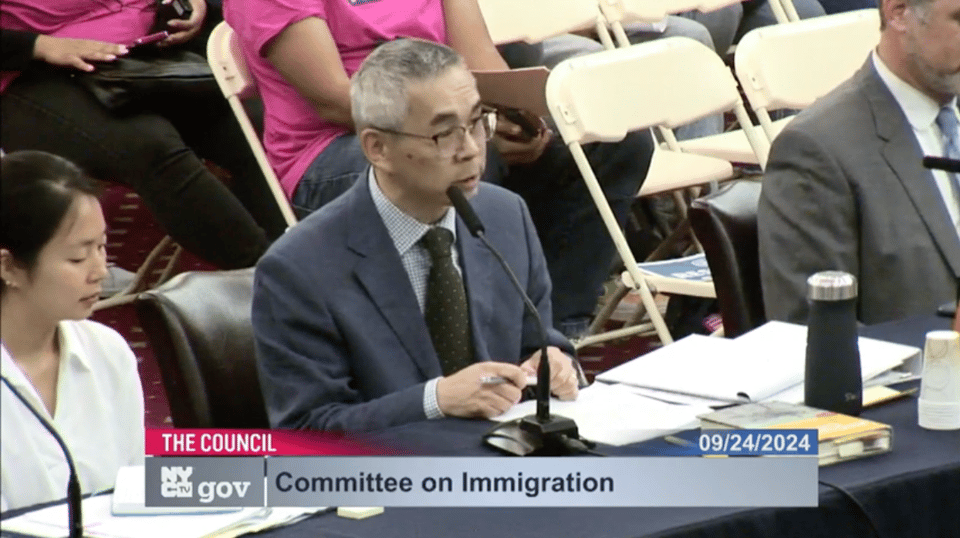 Kenneth Lo, Senior Advisor for Language Access at the Mayor's Office of Immigrant Affairs (MOIA) gives testimony.
Kenneth Lo, Senior Advisor for Language Access at the Mayor's Office of Immigrant Affairs (MOIA) gives testimony.
Local Law 30 of 2017 mandates NYC city agencies to increase language access to their services via various requirements around providing translation and interpretation.
- Chair Alexa Avilés walks through some of the details of the law. Link
- Multiple oversight hearings revealed non-compliance with the law. Link
- Over 217,300 immigrants have arrived in NYC since the spring of 2020. Link
- NYC represents 10% of the world's languages. 22% of New Yorkers are considered to have limited English proficiency (LEP). Link
- The LEP population of NYC would be the 4th largest city in the US if considered on its own.
- MOIA states that they've found that agencies are largely in compliance. Link
- Alexa Avilés takes issue with the language used by MOIA regarding compliance: "to a degree", "generally compliant". Among other things, MOIA states they are not an enforcement agency. Link
- In response to a question about where enforcement of Local Law 30 should lie, the Mayor's Office of Operations replies that this is a trick question. Link 1 Link 2
- Avilés highlights a story regarding a fire emergency involving 140 people, most of whom had limited English proficiency, for whom NYC had no documentation for emergency services. Link
- MOIA aims to have two specialists for each language they need to cover. Link
- MOIA currently has 13 language specialists covering 9 languages. 4 languages have 2 linguists each, while 5 languages have 1 specialist. Link
- Agencies largely contract out translation, while MOIA and the health department in particular have embedded linguists. Link
- MOIA is still looking to fill the Urdu specialist position (here is the JD). Link
Hearing on reforming and improving transparency in the Department of Corrections (DOC) and Correctional Health Services (CHS)
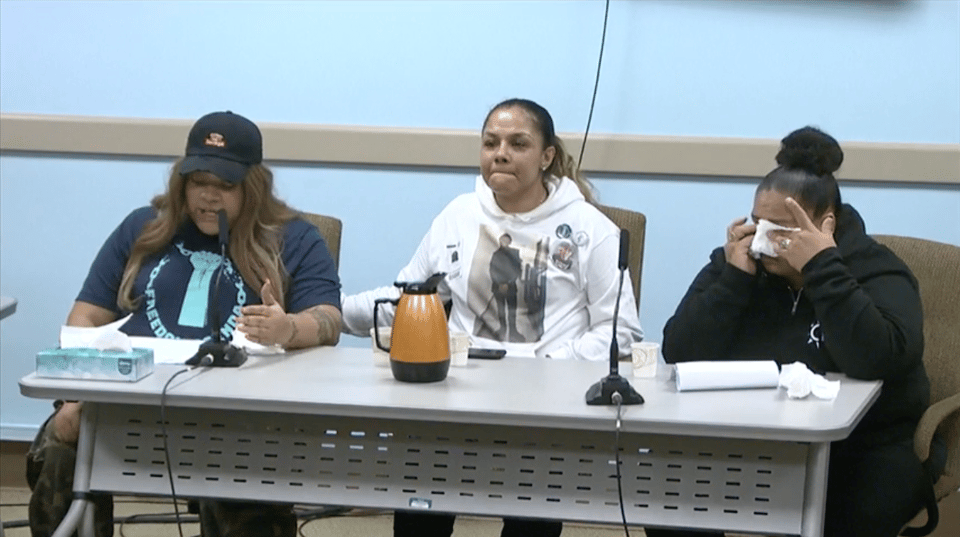 Family members of individuals who died or were seriously harmed at Rikers give testimony.
Family members of individuals who died or were seriously harmed at Rikers give testimony.
- Sandy Nurse addresses the fact that NYC's DOC may be taken over the federal government because of conditions on Rikers Island. Link
- Tiffany Cabán's bill promotes more humane language in the criminal justice system and cites various studies in support. Link
- Multiple members of the public share stories of family who died or were seriously harmed while incarcerated at Rikers.
- Khadira Savage talks about her brother, Roy Savage
- Lezandre Khadu talks about her son, Stephan Khadu
- Joanne De la Paz talks about her son.
- Diana Ayala shares that she was also not notified when her brother was stabbed twice while incarcerated last year. Link
- Ayala confronts DOC/CHS directly about the lack of family notification. Link
- The DOC has 18 chaplains, part-time and full-time, who are responsible for notifying next-of-kin of the death of an incarcerated individual. Link
- 1,400-1,500 individuals were transferred to CHS with serious medial injuries last year. Link
Remarks from this week's Stated Meeting
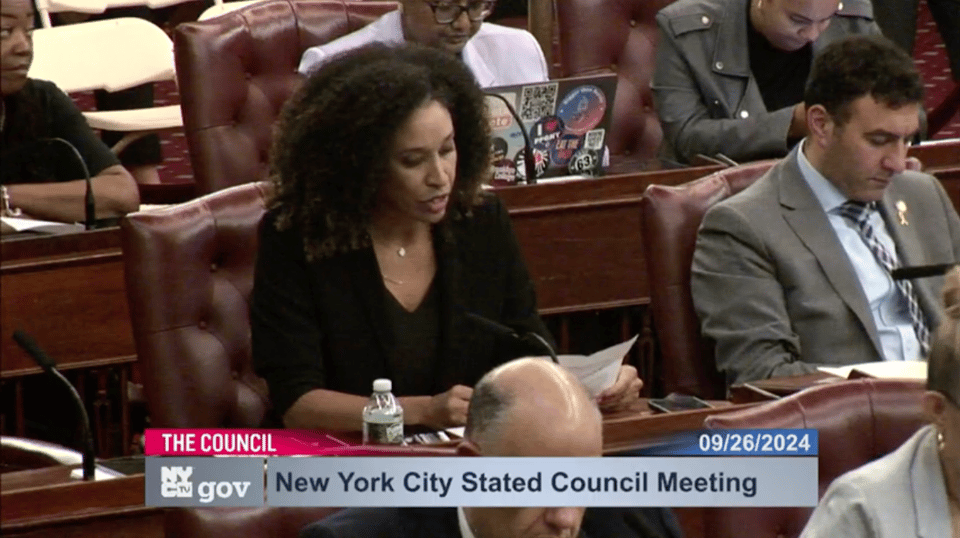 Sandy Nurse talks about her bill requiring 150 megawatts of solar capacity on public sites by 2035.
Sandy Nurse talks about her bill requiring 150 megawatts of solar capacity on public sites by 2035.
This Stated Meeting happened the day after news broke about the mayor's indictment.
It was strictly business! (Speaker Adrienne Adams discussed the indictment with the press at the pre-Stated Meeting press conference.)
- The closest anyone got to referring to the indictment was Lincoln Restler, who introduced a bill to repeal a form the mayor requires elected officials to fill out to engage with him. Link
- " I am proud, well, I guess when we drafted this bill, it was kind of during quaint times before the chaos of today."
- "I think it's unclear whether the mayor's gonna be around to continue to implement his form."
- Mercedes Narcisse remarks on her bill that decriminalizes jaywalking. Link
- Sandy Nurse discusses her bill requiring NYC to install 150 megawatts of solar capacity on public sites by 2035. Link
- Shaun Abreu discusses his bill to create a pilot program for rat contraceptives. Link
- Kamillah Hanks discusses the Benjamin Prine Act, which aims to perserve African America burial grounds around NYC. Link
- Farah Louis introduces a bill to improve reporting on sexual abuse in correctional facilities. Link
- Rita Joseph introduces a bill requiring annual reporting on student journalism programs. Link
- Pierina Ana Sanchez introduces the Housing Rescue and Resident Protection Act, aimed at addressing distressed buildings. Link
- Vickie Paladino pays tribute to a sanitation worker, Richard Errico, who died on the job in her district. Link
- Gale Brewer introduces a bill to study siren noise pollution. Link
- Linda Lee introduces a bill to establish a 3-year pilot program for postpartum support groups. Link
- Yusef Salaam's remarks on the Malcom Shabazz Harlem Plaza, previously heard at this meeting. Link
- Kevin Riley speaks about his bill to distribute materials addressing pregnancy loss and mental health support. Link
Thanks for reading!
Comments, questions, or feedback? Reply to this email or shoot me a note at vikram@citymeetings.nyc